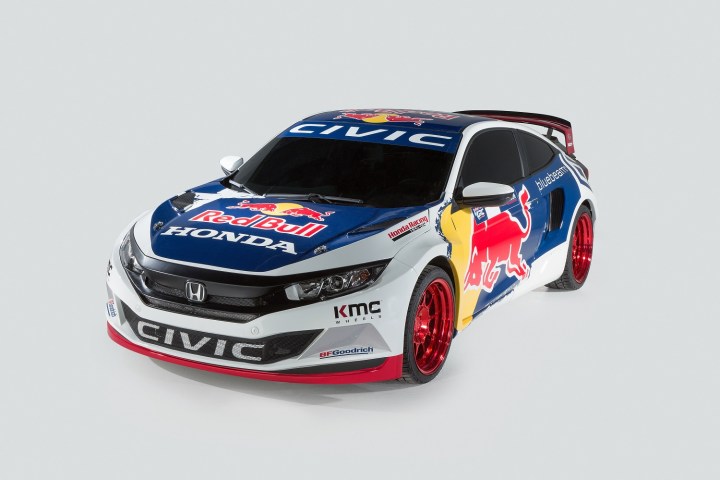
Developed with input from tuner Olsbergs MSE, the Rallycross-bound Civic is powered by a purpose-designed engine that sends a solid 600 horsepower to all four wheels. Full performance specifications aren’t available yet, but Honda promises the Civic can hit 60 mph from a stop in just 1.9 seconds. In other words, it’s faster than even the acclaimed 1,500 horsepower Bugatti Chiron.
Honda’s Performance Development division (HPD) has made comprehensive chassis modifications to prepare the Civic for competition on dirt, on asphalt, and in the mud. Notably, the suspension system has been upgraded to handle the massive 70-foot table-top jumps that are found on every track.
It’s impossible to mistake the GRC-bound racer for a regular Civic Coupe. It rides on red alloys tucked under wide fender flares, and it gets a deeper front bumper that incorporates a wide air dam as well as a massive wing out back for extra downforce. The cabin has been stripped of all equipment deemed superfluous — including the sound-deadening material, the radio, and the rear seats — in order to shed as much weight as possible, and Honda has added a bucket seat and a full roll cage for the sake of safety.
Honda is putting the Civic Coupe GRC in the hands of Sebastian Eriksson and Joni Wiman, experienced pilots that hail from Sweden and Finland, respectively.
The Honda Civic Coupe GRC will be shown to the public this week during the New York Auto Show, and it will make its competition debut on May 21 in Phoenix, Arizona. To capture the first spot on the podium, it will have to beat similarly-modified versions of the Chevrolet Sonic, the Hyundai Veloster, the Subaru WRX STI, and the Volkswagen Beetle, among others.





